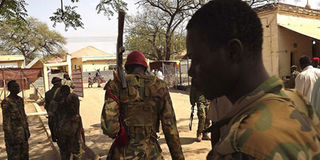South Sudan bleeds, and the nation’s leaders must now staunch the wound

Soldiers from South Sudan's army patrol the streets of Malakal in the Upper Nile State of South Sudan on December 31, 2013. PHOTO | SAMIR BOL
What you need to know:
- It was only a matter of time before the war between the largely Islamic and predominantly Arabic north and the south would morph into a post-independence power struggle
- Kiir and Machar have no alternative but to lay down their arms and begin to cultivate in the new nation a culture of dialogue and consensus
Why am I not surprised that South Sudan is imploding just two years after becoming an independent state? Perhaps it is because, deep down inside, we all expected something like this to happen.
We knew it was only a matter of time before the war between the largely Islamic and predominantly Arabic north and the south would morph into a post-independence power struggle for the soul of the new nation.
Before South Sudan attained its independence, the sole focus of its people had been to break away from Khartoum. Dr John Garang’s Sudan People’s Liberation Movement (SPLM) became a unifying platform, representing the collective aspirations of an otherwise disparate population with little else to hold them together.
The so-called Comprehensive Peace Agreement between the SPLM and the government of Sudan, which was signed in 2005, was seen by many as the beginning of a new journey of peaceful co-existence, hope and prosperity for the people of South Sudan.
Many observers around the world believed, or at least wanted to believe, that all the ills of South Sudan were due to the oppressive rule of the Khartoum regime, and once independent, those troubles would disappear.
But there were sceptics whose view of South Sudan has always been that it would not, and perhaps could never, become a “nation”. In their view, South Sudan does not possess any physical, social or religious ingredients for nationhood.
DID NOT PROVIDE A TIMELINE
Regardless of these divergent views, the people of South Sudan were single-minded in their quest. They wanted their own country.
The CPA did not grant the Southerners this wish, but it did provide a timetable by which they would conduct a referendum to decide whether or not to break away and form an independent nation. That referendum took place in January 2011. An overwhelming 98 per cent of the people voted in favour of independence.
But as the dust settled on the celebrations marking the creation of the new state, and as the world’s cameras moved on to other stories, a new reality began to dawn on the people of South Sudan; that having their own country is only a first step in a long, arduous journey toward the bigger and more elusive goal of nationhood.
As Kenyans discovered during the post-election violence of 2008, a country can unravel in a day due to unresolved socio-economic and political issues.
Unresolved issues do not go away; they wait for an opportune moment to surface – sometimes with a destructive force of violence that, if not contained, can cripple a country for life.
Given the fragility of the new government of South Sudan, the question was never really if, but when, the eruption would happen. At some point in its history, the people of South Sudan were going to have to come to terms with the demands of nationhood. What has surprised many is the speed with which that critical moment has come.
So, how prepared are the country’s leaders to deal with the onerous task that lies before them? What will it take to build a nation out of a population that is so divided and so deeply wounded?
How do you begin to forge trust and a sense of oneness among a people who have been scattered across the globe because of war, and who have been hardened by decades of unrelenting suffering? How do you craft in the minds and hearts of the people an appreciation of values like democracy, justice and equality?
The answers to these difficult questions can be summarised in one word: leadership. The volatile place in which South Sudan finds itself demands extraordinary leadership; one with both the insight and humility to understand and seize the moment to rise above personal and factional interests for the good of the nation.
The world is rooting for Sudan to make it safely across this first major test in its journey as a nation.
President Salva Kiir and former Vice-President Riek Machar have no alternative but to lay down their arms and begin to cultivate in the new nation a culture of dialogue and consensus as a way of resolving disputes. History will judge them harshly if they bungle this critical moment. (READ: Kiir and Machar set for South Sudan ceasefire talks in Addis)
Mr Ondeng is the director of East Africa Leadership Institute and a strategy consultant for Kenya’s Ministry of Foreign Affairs and International Trade. ([email protected])





